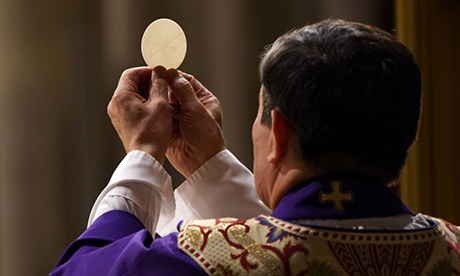Efforts by some US bishops to exclude Catholic politicians — including President Joe Biden — from receiving Communion has prompted concerns that the Eucharist is being weaponised for political purposes.
“The Eucharist must never be instrumentalised for a political end, no matter how important,” said Bishop Robert W. McElroy of San Diego.
President Biden was reportedly denied Communion in October 2019 when he attended Mass while campaigning in South Carolina.
The priest argued that “any public figure who advocates for abortion places himself or herself outside of church teaching.”
Backers of eucharistic exclusion cite St Paul’s exhortation “not to eat or drink unworthily at the table of the Lord.”
But they de-emphasize every element of St. Paul except for “discipline,” making it instead “a theology of unworthiness,” McElroy said.
And, if “abortion and euthanasia are particularly grave evils, they are intrinsically evil, and they involve threats to human life,” he asked, then “why hasn’t racism been included in the call for eucharistic sanctions against political leaders?”
“It will be impossible to convince large numbers of Catholics in our nation that this omission does not spring from a desire to limit the impact of exclusion to Democratic public leaders and a desire to avoid detracting from the focus on abortion,” McElroy said.
McElroy’s America essay came soon after Archbishop Salvatore J. Cordileone of San Francisco issued a pastoral letter saying: “Those who reject the teaching of the church on the sanctity of human life and those who do not seek to live in accordance with that teaching should not receive the Eucharist.”
Although McElroy did not identify Cordileone by name, he commented that those aligned with this movement use three arguments to justify their position for “a national policy of eucharistic exclusion”: support of abortion that departs from church teaching; a “theology of worthiness” to receive Communion — a rite in which the assembly prays to being, “Lord, I am not worthy”; and a persistent rejection of clear Catholic teaching that “extinguishes that worthiness.”
The bishop cited the Second Vatican Council and the last three popes to blunt those arguments.
The Vatican II document “Lumen Gentium” says Jesus instituted the Eucharist as “a memorial of his death and resurrection: a sacrament of love, a sign of unity, a bond of charity.”
But “a national policy of excluding pro-choice political leaders from the Eucharist will constitute an assault on that unity, on that charity,” McElroy said.
McElroy added: “I do not see how depriving the president or other political leaders of Eucharist based on their public policy stance can be interpreted in our society as anything other than the Eucharist being weaponised.
“It is an effort not to convince people by argument and by dialogue and by reason, but, rather, to pummel them into submission on the issue.”
“At a time when we are emerging from a pandemic and seeking to rebuild the eucharistic community, it would be particularly wounding to embrace and emphasize a theology of unworthiness and exclusion rather than a theology that emphasizes Christ’s unrelenting invitation to all,” McElroy said.
